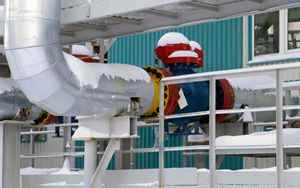(Finance) – “There is a risk that any escalation may entail sanctions on the Russian Nord Stream 2 pipeline, which they would potentially end up with reduce flows to Europe [del gas russo] for an indefinite period“. Is the warning of Goldman Sachs following the tensions in Ukraine, after Moscow began to amass about 100,000 soldiers near the border and the US and the European Union said they were ready to impose sanctions on the country led by Vladimir Putin. Analysts still think the strategic Nord Stream 2 pipeline will enter in operation in the second quarterbut delays in the approval process and escalating tensions in Ukraine could push her into service towards the end of the year or beyond. Meanwhile, today the price of TTF gas futures contracts, used by operators as a benchmark for the European market, shows an increase of 11.9% to 88.39 euro / MWh.
“If tensions between Russia and Ukraine were to escalate, the initial uncertainty about its impact on gas flows would likely lead the market to once again add a significant risk premium to gas prices in Europe – reads the bank’s research. US – Although we are of the opinion that the current tightness of gas balances in Europe would discourage the EU from blocking any existing gas flows from Russia, we do not exclude in this scenario that the market briefly revises the maximum of 180 euro / MWh observed in mid-December or even higher levels“.
The general conditions
Upside risks to gas prices in Europe primarily include sentiment on the demand side and Russian exports on the supply side, according to the US investment bank. In particular, from a supply perspective, “although LNG imports from Northwestern Europe have increased by more than 60% this month to record levels, this positive surprise is 35% lower than the negative surprise in Russian exports” , the research reads. Basically, the supply shortage of the Old Continent has not been resolved.
Medium-term prospects
Goldman Sachs predicts a sequential decline in Dutch gas production until at least 2023 (due to the government-mandated closure of the Groningen field), as well as a sequential decline in European LNG imports until at least 2024, due to Asian demand that grows faster than global LNG supplies. “Even assuming a normalization of Russian flows in the region starting this summer, that leaves it Northwestern European gas budgets narrower than the five-year average at least until 2025, when we expect that a new wave of liquefaction projects, currently under construction, will finally increase the supply of LNG globally, “the analyst thesis. Until then, barring warmer-than-average winters, TTF gas prices they should remain at more than double the average price of the last 10 years.
The impact of decarbonisation
Decarbonisation efforts are noted to have contributed to under-investment in the energy sector and the tightening of the emissions market in Europe has increased costs for European energy producers. “With the shortage of natural gas forcing a gas-to-coal substitution process in the generation sector, thus increasing carbon emissions, this impact of greenflation is exacerbated, spreading the inflationary impact of the gas crisis to all carbon-containing goods in the economy, “argues the US bank.”With natural gas upstream investments excluded from the EU’s green taxonomy, the region is in a worse position from a global gas supply perspective., having to continue to rely heavily on imports, while China benefits from near-autonomy from cheaper coal and the US from its own domestic shale gas supply, ”Goldman Sachs concluded.
